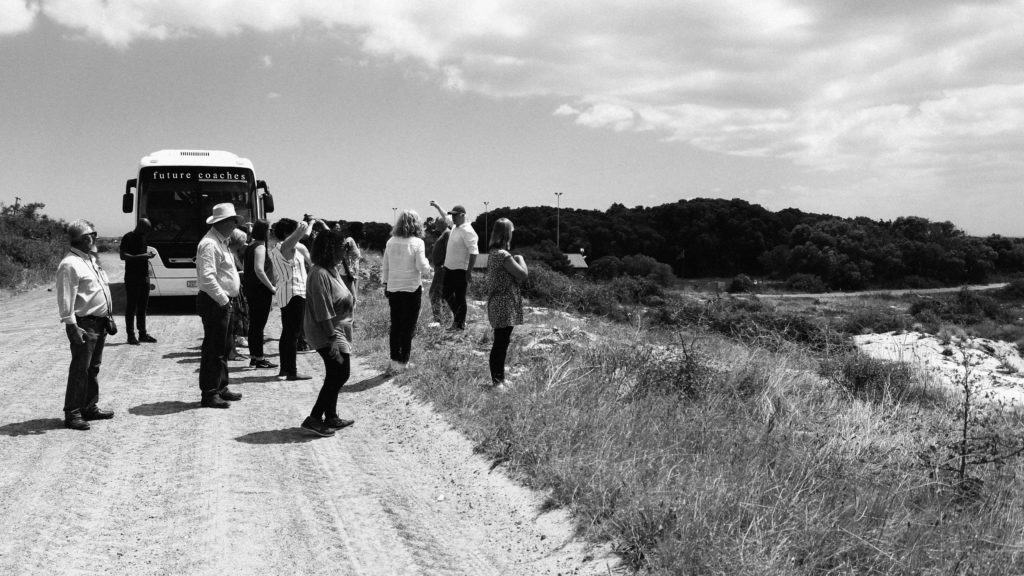
One of the first stops on the CoP’s field trip was the expansive Philippi Horticultural Area, home not only to countless small-scale farmers, but also housing developments and industrial interests.
It’s not too hard to imagine how an urban farming expanse on the Cape Flats and Cape Town’s historic fresh-produce market fit into the city’s vast and web-like food system, but what of a bustling taxi rank?
Even a cursory examination illustrates the role of the Bellville Public Transport Interchange, for instance, in that network. Every single day, the Interchange (incorporating the train station, a bus terminus and taxi rank) is known to log substantial foot traffic. Many of these commuters, while moving through the Interchange, shop for food and snacks from the tangle of formal and informal traders amassed there.
Which is why – in exploring the production, distribution and consumption of food in the city – the Local Food System Governance Community of Practice (CoP), associated with the DST-NRF Centre of Excellence in Food Security (CoE-FS), decided on the interchange as the last stop on its Cape Town Food System Field Trip on 22 January. But first the group was bussed to two other sites along that value chain: the Philippi Horticultural Area (PHA) and the Cape Town Fresh Produce Market (CTFPM).
The field trip was designed by Gareth Haysom and Robyn Ross-Park of the African Centre for Cities (ACC) at the University of Cape Town to stimulate honest conversation and dissenting views. The foray into the city was also a decided but necessary change of pace from previous meetings.
There are conversations you can have in a closed-room space, but the minute you get out into the field – when one starts sensing that space at more than a kind of intellectual level, when you can smell, see, hear and engage – it becomes a very different experience.
The CoP is a diverse group of some 30 stakeholders representing academia and think tanks, local and provincial government, civil society organisations, and business and private enterprises, explains Dr Camilla Adelle, a senior research fellow associated with the Centre for the Study of Governance Innovation at the University of Pretoria, co-host of the CoE-FS. Meeting a few times every year, the group aims to share information and expertise, to co-create new knowledge, and to stimulate the kinds of joint learning that inform governance, policy and practice around food security in the Western Cape.
“It’s meant to foster quite close conversations and learning,” says Adelle.
While hardly exhaustive, the PHA, the Cape Town Fresh Produce Market and the Bellville Interchange were selected as stopovers because they are all “contested spaces”, says Haysom. Between them, they also offer representative glimpses into the challenges in the city’s food system.
The PHA, which sits 25km from Cape Town’s central business district (CBD), spans some 3,000 hectares in total and about 1800 ha of farmed land. There is a likelihood that this could shrink substantially thanks to increasing housing development proposals, land invasions and other forms of land use. Established over 50 years ago, the Cape Town Fresh Produce Market today brings together over 5,500 producers and approximately 8,000 registered buyers, but also faces growing competition from the largely informal community market almost literally on its doorsteps, and formal distribution centres and supermarket chains, according to Haysom. And the famously contentious Bellville Public Transport Interchange – second or third only to the Cape Town Station and the Khayelitsha Public Transport Interchange in terms of volume of users – has evolved its own ecosystem as largely informal (and illegal) food traders have set up store on pavements, in front of the shopping mall, and on whatever vacant spots traffic and lenient policing allows.
Over the field trip, discussions touched on a host of intercutting topics. Not least among these were the rich and complex histories of the spaces; ecological and environmental concerns; the choices facing land use; the lack of support for small-scale farmers; land reform; governance and regulation; the rise and impact of Big Food on farming and eating patterns; the management of water resources; and the fact that the City of Cape Town does not have a food security mandate, spawning all manner of governance vacuums.
For the participants, the day provided more than just new sights and sounds and smells. Washiela Isaacs, an urban small-scale farmer affiliated to the Umthunzi Farming Community, found plenty of interest: new information and contacts to share with her network, offers of mentorship from within the CoP group, and revelations about conditions at and changes to the PHA. “And what I really liked was that the discussions wasn’t just in a room,” says Isaacs.
Cayley Green, senior resilience analyst at the City of Cape Town, discovered depths of understanding that desktop research often can’t match, she says, while the field trip serving as useful supplement to standard CoP meetings. “Field trips like [these] are hugely valuable to policy practitioners as it allows us to see the reality on the ground while engaging with multiple viewpoints and hearing various arguments regarding different issues,” she says.
As Florian Kroll of UWC’s Institute for Poverty, Land and Agrarian Studies pointed out at the end of the day, the field trip has set the bar for the year’s CoP meetings pretty high.
related Articles
CoE-FS 10th Anniversary Symposium – Governance and policy
Date: Wednesday, 22 May 2024 Time: 10h00 – 12h00 (SAST) Register for Zoom here. Co-chaired by Professor Julian May (CoE-FS…
‘If we fail on food, we fail on everything’
“If there’s one thing I take away, [it’s that] ‘if we fail on food, we fail on everything’,” says CoE-FS…
New book: “Resilience and Food Security in a Food Systems Context”
Resilience and Food Security in a Food Systems Context is a recently published, open-access resource which delves into why we…



